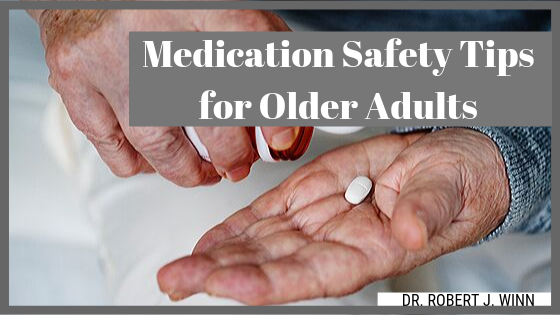As we age, we often find ourselves taking more prescription medications. Part of the aging process means our bodies don’t always function as well as they used to. Often we find ourselves taking medications to counterbalance the side effects of aging. According to Today’s Caregiver, “the average senior citizen uses more than five different medications each day. This does not count nonprescription, over-the-counter drugs.”
The more we age and the more medications we take, the higher our chances are of experiencing a medication-related complication. Every drug has the potential to cause an allergic reaction, side effects, or interaction with other drugs, food, or alcohol. Seniors are often more susceptible to these risks. Not only that but as we get older, our body’s ability to absorb certain medications may change. Here are some tips for older adults to ensure their safety when it comes to taking prescription drugs.
Follow the Doctor’s Directions
Though this is true for all individuals, it’s particularly crucial for seniors to take their medications as prescribed. Avoid skipping doses and don’t stop taking a medication without consulting your physician. Many medications only work or work best when taken regularly. Chronic health conditions often require medications to be taken continuously to keep the disease in check. Failing to take medications as directed can have adverse effects. Even if you’re feeling better or you have problematic side effects, check with your doctor before making any changes to your medication regimen.
Keep Track of Medications
It’s wise to keep a written list of all the medications you take with you at all times. This is especially true when traveling. Don’t forget any over the counter or herbal supplements you may be taking. In the event of an emergency, this list can help doctors treat you appropriately. Bring this list with the names of your medications, dosages, and time you take them to all of your doctor’s appointments. Often as we age, we are under the care of multiple physicians and specialists. Often one doctor may be unaware of medications prescribed by another. Having the list can help your health care providers determine the best course of action to keep you as healthy as possible and prevent any dangerous drug interactions.
Awareness of Possible Interactions
Drug interactions can occur when one drug affects how another works, a drug reacts with something you eat or drink, or a health condition makes a particular drug harmful. Some over-the-counter medications and herbal supplements can interact with prescription medications, as well. Be aware of the potential for these types of interactions and be familiar with the signs of such a reaction. Read prescription labels carefully and ask your doctor or pharmacist about potential interactions.
Review of Medications
On at least an annual basis, it is a good idea to review your medications with your health care providers. Confirm the need to continue taking each of your medications. If you’re struggling to cover the costs of certain prescriptions, you should inform your physicians and ask if there may be cheaper alternatives that will work the same.


